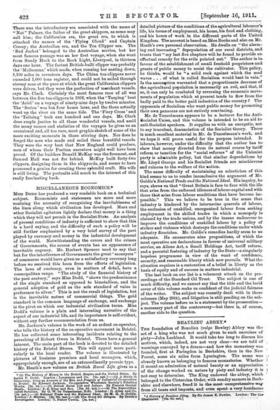BEAULIEU ABBEY.*
THE foundation of Beaulieu (vulgo Bewley) Abbey was the act of a king who was not much given to such exercises of piety—John Lackland. It would take too long to discuss his motives, which, indeed, are not very clear—we are told of warnings conveyed by a dream—and how the monastery was founded, first at Faringdon in Berkshire, then in the New Forest, some six miles from Lymington. The name was already known as belonging to famous monasteries. Whether it meant an admiration of natural beauty or an appreciation of the change worked on nature by piety and industry it ie not easy to determine. The King endowed the abbey, which belonged to the Cistercian Order, with sundry manors in Berk- shire and elsewhere, freed it in the most comprehensive Waif from all taxes and imposts, and even spent a very handsome • A History of Beaulieu Abbey. By Sir James K. Fowler. London: The Car Illustrated. [10s. 6d. net.] sum of money on the building. Henry ELT. continued his father's liberality ; other benefactions followed, and Beaulieu became .a place of considerable importance, though not in the first class of monastic foundations. It seems teliave been, for a time at least, a mitred abbey. It does not, however, appear in Fuller's list. Still the buildings make a splendid show as they appear in the conjectural restoration, which we owe to the ingenuity of Mr. Harold Brakspear. The precincts inclosed an area of fifty-eight acres;. the Abbey Church measured 336 feet from east'to west and 186 feet across the transepts from north to south ; the cloister was a square of about .136 feet. The refectory, which is the only part of the old buildings still standing in its integrity, now serves as the Parish 'Church, and has accommodation, Crockford tells us, for 500 worshippers. And when the Dissolution came all this splendour was sparsely inhabited by an abbot and twenty monks. It is in such facts that we see one potent cause •of the downfall of the monasteries. They were perishing of inanition. The Abbey can scarcely be said to have a history. A few scattered notices of business transactions, all of a trivial kind, remains. The catalogue of the library, made by Leland, con- tains just ten books. "The Cistercians of Beaulieu," as Sir J. K. Fowler. remarks, " were not a literary set." One of the most important matters relating to the Abbey was the right of sanctuary which it seems to have possessed, at least during the latter centuries of its existence. In the sentence, "Conferred in the reign of Edward III. by a Bull of Pope Innocent IIL," we should read "Innocent VL"











































 Previous page
Previous page